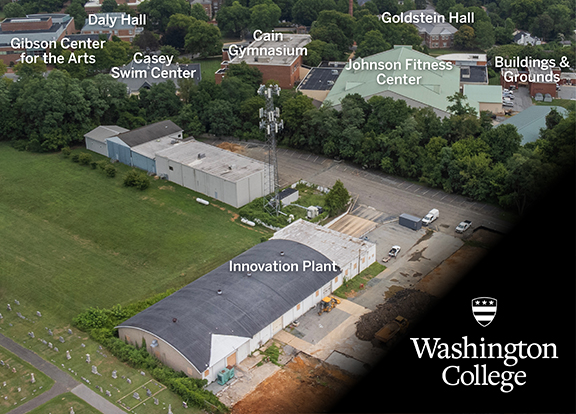Washington College has secured a significant boost for its Innovation Plant project, thanks to a generous $1,846,000 grant from the Philip E. & Carole R. Ratcliffe Foundation. The funds will be used to revitalize a portion of the historic Dixon Valve property on High Street in Chestertown, creating a collaborative space for students, entrepreneurs, and community members to engage, work together, innovate and grow as makers and entrepreneurs.
The Innovation Plant, a long-awaited project that will expand the capabilities and reach of the College’s current maker and entrepreneurship initiatives, aims to foster a culture of innovation and entrepreneurship in the region. It will provide a community-facing space for individuals to develop new ideas, build prototypes, and potentially launch small businesses. The project aligns with the Ratcliffe Foundation’s mission of expanding economic opportunity and job creation in local communities.
“We are thrilled to receive this substantial grant from the Ratcliffe Foundation,” said President Mike Sosulski. “Their impressive support will enable us to transform a portion of what was a historic but long unused property into a vibrant hub of innovation and creativity for Kent County and the Eastern Shore. Continuing to invest in and expand the opportunities available for our community and our students remains a priority for Washington College.”
The Innovation Plant will offer a variety of resources, including a mobile innovation lab, community engagement opportunities, and paid internships for students. The Ratcliffe grant will fund the first phase of building renovations, continued gathering of community input, the mobile lab, and an investment in creating high school and college curriculums that help students make full use of the new resources.
 The mobile lab will serve as a free tool-lending library and classroom, providing basic carpentry, construction and yard working tools to community, campus, and nonprofit participants to be used for home improvement, neighborhood beautification, and small business projects. The Innovation Plant will provide valuable hands-on experience and support for aspiring entrepreneurs and innovators throughout the Upper Eastern Shore region.
The mobile lab will serve as a free tool-lending library and classroom, providing basic carpentry, construction and yard working tools to community, campus, and nonprofit participants to be used for home improvement, neighborhood beautification, and small business projects. The Innovation Plant will provide valuable hands-on experience and support for aspiring entrepreneurs and innovators throughout the Upper Eastern Shore region.
Chestertown Mayor David Foster called the planned space a “game changer for the community” at the project’s outset. “It will attract talented individuals, stimulate economic growth, and enhance our reputation as a center for innovation,” he said.
The Curriculum Innovation Fellowship Program, will provide for teaching stipends and educational supplies to go toward teachers at Washington College, Chesapeake College, and local schools including Kent County High School, as well as mentorship organizations. Expanding the capabilities and resources available to educators in the region aligns with Washington’s continuing mission to inspire and enable emerging citizen leaders to discover lives of purpose and passion.
Patrick Nugent, Washington’s Thomas V. Mike Miller Director of Civic Engagement, is particularly excited about the Fellowship program. “This is an initiative that will invest in local teachers and students and ensure the Innovation Plant is humming with educational and entrepreneurial opportunities when it opens to the public,” said Nugent.
The Dixon Valve property has a rich history, having served as a manufacturing facility for many years. By repurposing part of this historic site, which was also once home to the Vita Foods factory and warehouse, Washington College is preserving a piece of Chestertown’s heritage while creating a space that will benefit future generations. Utilizing its resources and expertise, the College continues to conduct significant heritage, oral history, and archival work to better tell the site’s history as well as preserve some artifacts for potential future installation. The public is invited to peruse the recorded interviews and nearly 100 digitized archival photos accessible in the Washington College Starr Center for the Study of the American Experience’s Chesapeake Heartland Digital Archive.
Over the past year, the College has worked with the Chestertown and Kent County community to incorporate a diverse array of voices into the plans for the space including public meetings, community surveys, and focus groups with over 700 participants. As the project moves forward, Washington College will continue to engage the community to gather input and ensure that the Innovation Plant meets stakeholder needs. The College is committed to creating a space that is inclusive, accessible, and inspiring for all.
As a testament to its potential impact on the community, the Plant continues to receive support from other sources as well. This year, the College was again awarded a prestigious grant from TEDCO, the Maryland Technology Development Corporation, which aims to enhance economic empowerment growth through the fostering of an inclusive entrepreneurial innovation ecosystem. This is the second year the College received a grant from the organization as part of their Maryland Makerspace Initiative Program.


Matthew Tobriner says
As the program content for the Innovation Plant is developed over the coming years I urge Washington College to include the study of how corporate structure and employee ownership impact and stimulate the innovation that the program is seeking. There is no doubt that employee ownership and involvement in governance play a huge roll in the success of innovative businesses. Figuring out how to do it well and understanding how the proven tools work will take some focused effort and should be an integral part of this exciting program.